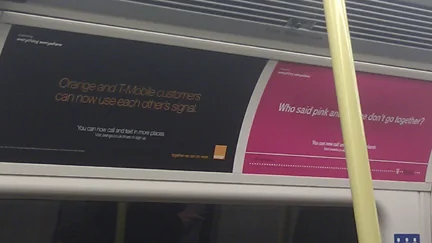I wonder if anyone else has noticed this awful advert for Brita water-filtering jugs. I was away for two weeks and when I came back it was still there on the wall at Tottenham Court Road tube station. The tag line reads "Vote for your favourite colour and you could win £2,000."
For some people, that they can finally purchase a water-filtering jug to properly match the curtains is I'm sure quite compelling, and I know there's £2,000 to win, but I can't help but be reminded of the pointless drive-to-web concepts lamented in Brian's 'Open Letter to All of Advertising and Marketing'. Do people really want to visit an advertiser's microsite for no particularly good reason?
A cash incentive may be more motivating than, say, the opportunity to upload a film of yourself explaining in less than thirty seconds why a pink water-filtering jug is so much better than a white one, and might more easily lead to greater response; but we know that luring people with the prospect of material gain often impacts negatively on the quality of a lead. (Actually, is filtering-jug-fanatical better than sane?)
Like any investment, when an advertiser incentivises response they raise the stakes in their gamble on a profitable return. So long as the volume of attracted and engaged visitors corresponds to the size of the incentive offered, then that incentive can be as big as the ad's reach allows.
But can an incentive go too far? Can an incentive, for example, be so large that the prospect of actually winning or receiving it becomes incredible, and so not worth pursuing? "Nah, I'll never win that!"
Or is there some level of incentive for some brands or products past which consumers begin to conclude, "they're making far too much money - they can hardly be offering good value!"
Or maybe there are only so many consumers out there who are capable of forming a genuine opinion about coloured water filters; after a point, increasing your incentive merely brings in more of those who really just want a chance at £2,000, and will unsubscribe you in a flash if you even so much as think about sending them an email.
In digital advertising of course, campaign tracking can help each individual different advertiser get it right. We can monitor how many people see an ad, and how many of those people respond and engage; we can simultaneously test response rates for different incentive levels, and discover the sweetest one; and we can watch what happens to the ongoing value of each group of responsive consumers, so as to be sure that we maintain a true sense of profitability. Nobody often can count on getting it right all the time, but we can quickly, continuously and reliably identify what's not working, and carry on with the business of getting it right. As Avinash Kaushik has written, "God created the Internet so we could fail faster".
EDIT, 8 October:
I know most people won't find this quite so deeply ironic as I do, but I couldn't help but notice that the very same placement previously occupied by the rubbish Brita ad was yesterday replaced by this one from Google:
The copy reads, "Making display advertising amazing isn't a techie problem. / It's a techie dream. / WATCH THIS SPACE. / This ad is for all the media people on the platform, particularly the ones wondering how they can get richer data, better forecasting and more accurate targeting. If you want to know more visit google.co.uk/watchthisspace"
Great concept in combination with great media buying, I think. Certainly media people do 'index' highly on the platform at Tottenham Court Road, but there are loads of people for whom this ad doesn't mean a great deal. This very thought will cross a media person's mind; as will the thought of the beauty of digital: you don't have to waste inventory, because you can show in an ad placement only when it's almost certainly the right person watching.
